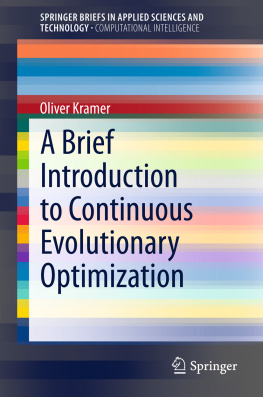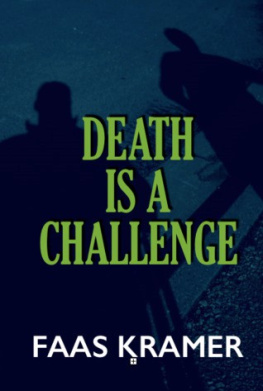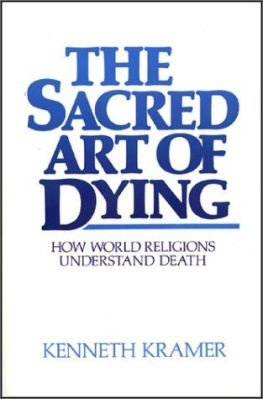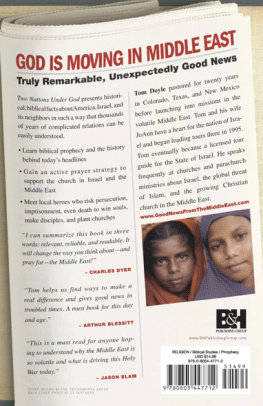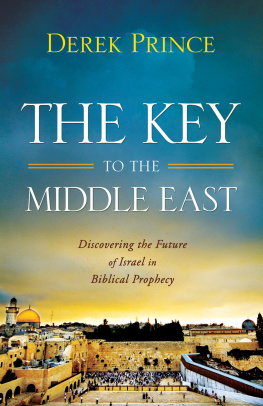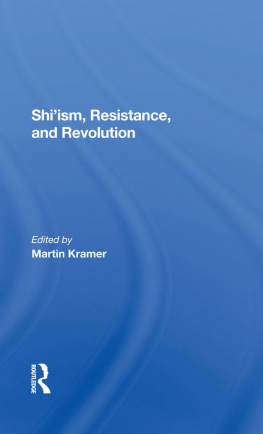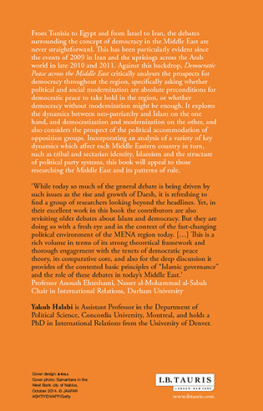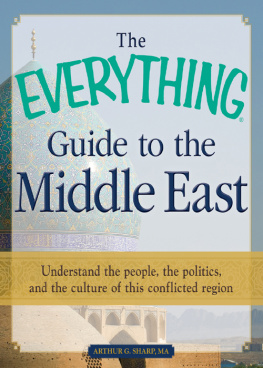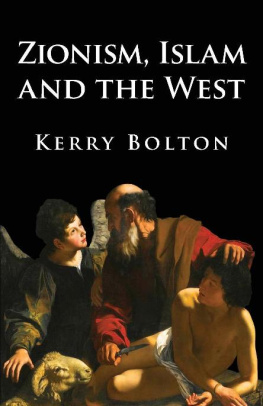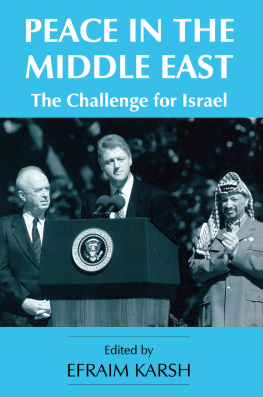Kramer - The war on error: Israel, Islam, and the Middle East
Here you can read online Kramer - The war on error: Israel, Islam, and the Middle East full text of the book (entire story) in english for free. Download pdf and epub, get meaning, cover and reviews about this ebook. City: Islamic countries;Middle East, year: 2017, publisher: Taylor and Francis;Transaction Publishers, genre: Art. Description of the work, (preface) as well as reviews are available. Best literature library LitArk.com created for fans of good reading and offers a wide selection of genres:
Romance novel
Science fiction
Adventure
Detective
Science
History
Home and family
Prose
Art
Politics
Computer
Non-fiction
Religion
Business
Children
Humor
Choose a favorite category and find really read worthwhile books. Enjoy immersion in the world of imagination, feel the emotions of the characters or learn something new for yourself, make an fascinating discovery.
The war on error: Israel, Islam, and the Middle East: summary, description and annotation
We offer to read an annotation, description, summary or preface (depends on what the author of the book "The war on error: Israel, Islam, and the Middle East" wrote himself). If you haven't found the necessary information about the book — write in the comments, we will try to find it.
The war on error: Israel, Islam, and the Middle East — read online for free the complete book (whole text) full work
Below is the text of the book, divided by pages. System saving the place of the last page read, allows you to conveniently read the book "The war on error: Israel, Islam, and the Middle East" online for free, without having to search again every time where you left off. Put a bookmark, and you can go to the page where you finished reading at any time.
Font size:
Interval:
Bookmark:

Israel, Islam, and the Middle East
Martin Kramer

First published 2016 by Transaction Publishers
Published 2017 by Routledge
2 Park Square, Milton Park, Abingdon, Oxon OX14 4RN
711 Third Avenue, New York, NY 10017, USA
Routledge is an imprint of the Taylor & Francis Group, an informa business
Copyright 2016 by Taylor & Francis.
All rights reserved. No part of this book may be reprinted or reproduced or utilised in any form or by any electronic, mechanical, or other means, now known or hereafter invented, including photocopying and recording, or in any information storage or retrieval system, without permission in writing from the publishers.
Notice:
Product or corporate names may be trademarks or registered trademarks, and are used only for identification and explanation without intent to infringe.
Library of Congress Catalog Number: 2016027265
Library of Congress Cataloging-in-Publication Data
Names: Kramer, Martin S., author.
Title: The war on error : Israel, Islam, and the Middle East / Martin Kramer.
Description: New Brunswick (U.S.A.) and London (U.K.) : Transaction Publishers, [2017] | Includes index.
Identifiers: LCCN 2016027265 (print) | LCCN 2016028138 (ebook) |
ISBN 9781412864336 (hardcover) | ISBN 9781412864992 (pbk.) |
ISBN 9781412864480 ()
Subjects: LCSH: Islam andpolitics. | Islam andpolitics--Islamiccountries.|
Middle East--History. | Arab-Israeli conflict--Influence.
Classification: LCC BP173.7 .K74 2017 (print) | LCC BP173.7 (ebook) |
DDC 956.04--dc23
LC record available at https://lccn.loc.gov/2016027265
ISBN 13: 978-1-4128-6433-6 (hbk)
ISBN 13: 978-1-4128-6499-2 (pbk)
To Eden, Noy, Gefen, and Itamar, lights of my life.
Tis Ambition enough to be employed as an Under-Labourer in clearing Ground a little, and removing some of the Rubbish, that lies in the way to Knowledge.
John Locke, An Essay Concerning Human Understanding (1689)
This book collects twenty-five of my articles, reviews, and lectures, framed by an introduction and epilogue. Some of the pieces are published here for the first time; all have been revised, some extensively. Many appeared originally at my weblog, Sandbox, now at www.martinkramer.org.
as a lecture for the Institute for the Study of Global Antisemitism in 2014; this is its first publication. I am grateful for permissions to reproduce previously published articles.
During the years when I wrote or revised these pieces, I had two primary affiliations. One was The Washington Institute for Near East Policy, where I served for over a decade as the Wexler-Fromer Fellow (named after four dear friends, Nina and Gary Wexler and Ann and Robert Fromer). The director, Robert Satloff, offered me a home away from home, and indulged me when I strayed far from the policy preserve. The other was the Shalem Center, now Shalem College, where I began as a research associate, and where I am now president. This book would not have been possible without the friendship and patience of Daniel Polisar, founder and provost of Shalem College, who assumed countless administrative burdens that should have fallen on me. During this same time, I also benefited from three-year affiliations with the Middle East Forum, where I served as editor of Middle East Quarterly in partnership with Daniel Pipes; and the John M. Olin Institute for Strategic Studies at Harvard, where I founded and edited Middle East Strategy at Harvard, in partnership with Stephen Rosen. There could be no finer colleagues.
Three of the pieces here, including the longest, passed through the expert editorial hands of Mosaic Magazines Neal Kozodoy, who turns everything he touches into gold.
I am continually nurtured by the love of my parents, Al and Anita Kramer, and my wife, Sandy, who took my many absences in stride, and gave me moral encouragement whenever I got into scrapes. Finally, I am thankful for the confidence of Mary Curtis, Transactions president and publisher, who sent me a contract less than twenty-four hours after receiving a one-paragraph proposal. It doesnt get better (or faster) than that.
In these first decades of the twenty-first century, the Middle East has become the preoccupation of the world, and the most contested and conflicted region on the planet. It has replaced Europe as the prime arena for wars, insurgencies, revolutions, mass murder, and refugee flows. Much of the Middle East has failed or hovers on the brink of failure. In the worlds capitals, the pressing question is this: can the Middle East be saved? Or, if it cant, can its noxious tide be stemmed?
Answering these questions is all the more difficult, because the Middle East is misunderstood. Despite the regions proximity to Europe and its history of continuous interaction with the West, it eludes the grasp of foreign publics, analysts, and policymakers. In the United States, half a globe away from the Middle East, the errors are endemic. This is a theme I developed in a 2001 book, Ivory Towers on Sand: The Failure of Middle Eastern Studies in America. There I demonstrated how the academic field devoted to the study of the Middle East was itself the source of repeated errors of understanding.
This book is a kind of sequel to that one, and an expansion of its scope. It is a sequel in that the twenty-five chapters here were written or extensively revised post-9/11. The parade of error has continued straight through the terrorist attacks on New York and Washington, the wars in Afghanistan and Iraq, and the Arab Spring and the Islamic State (ISIS). It is an expansion of scope, in that the arena of investigation is not limited to academe but includes government, journalism, filmmaking, and punditry. In this book, I also deepen the perspective, to incorporate not only errors in the interpretation of the present, but serious flaws in the representation of the historical record. This is because misinterpretations of the past often have deleterious effects in the here-and-now, and present concerns can twist perceptions of the past.
What do I mean by error? For my purposes, an error is an unintentional lapse that leaves a gap between reality and its representation. Such lapses may result from incomplete information. Parts of the Middle East long have been ruled by regimes that limit the free flow of information. When the evidence is thin, errors sometimes arise from the temptation to fill in a partial picture with theories and analogies. This is encouraged by the fact that the political and social categories of the Middle East may seem deceptively similar to those of the West. Religion, revolution, political party, democracy, electionstheir use in the Middle East imparts a sense of familiarity, but they often mean something very different.
Then there is the bias that arises from wishful thinking. For those who see the Middle East as a series of problems to be solved, the impulse to overlook contrary and discouraging evidence can be overwhelming. The conflicts of the Middle East may also provoke an eagerness to blame or exculpate one side or another, to the detriment of the truth. And those who set out to correct past errors occasionally overshoot their mark. In their zeal, they may end up substituting new myths for old.
The misinterpretations of the Middle East that arises from these causes may be described as errors. No one is immune from them, because no one has complete information, and no one is entirely free of bias. Here the objective must be the accumulation of more information and correcting for bias. When people are collectively committed to the pursuit of truth, and agree on the rules for establishing it, knowledge advances through the discovery and presentation of evidence and logic-based debate over its interpretation.
Next pageFont size:
Interval:
Bookmark:
Similar books «The war on error: Israel, Islam, and the Middle East»
Look at similar books to The war on error: Israel, Islam, and the Middle East. We have selected literature similar in name and meaning in the hope of providing readers with more options to find new, interesting, not yet read works.
Discussion, reviews of the book The war on error: Israel, Islam, and the Middle East and just readers' own opinions. Leave your comments, write what you think about the work, its meaning or the main characters. Specify what exactly you liked and what you didn't like, and why you think so.


